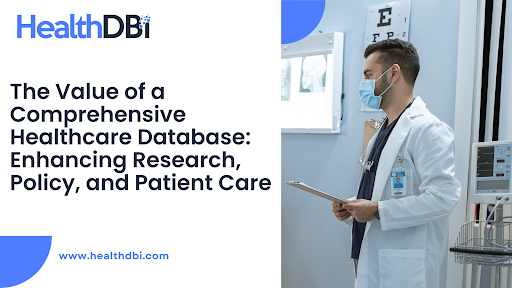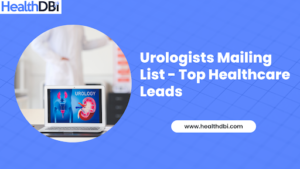The Value of a Comprehensive Healthcare Database: Enhancing Research, Policy, and Patient Care


Claim Your 7 days Free Trail Now!!!
Enhancing Research, Policy, and Patient Care
Access to accurate and comprehensive data is crucial for advancing research, shaping effective policies, and providing optimal patient care in the rapidly evolving healthcare field. A robust healthcare database is valuable for healthcare professionals, policymakers, and researchers. This blog will explore the immense value of a comprehensive healthcare database and its role in enhancing research, policy-making, and patient care.
1. Unlocking Research Potential
A comprehensive healthcare database serves as a goldmine of information for researchers. Researchers gain valuable insights into disease patterns, treatment effectiveness, and emerging health trends by analysing a vast array of medical records, patient data, treatment outcomes, and other relevant information. This data-driven approach enables the identification of risk factors, early detection of diseases, and the development of innovative therapies.
Moreover, a healthcare database facilitates collaboration among researchers by providing a centralised platform to share anonymized data securely. By pooling resources and expertise, scientists can conduct large-scale studies, leading to more accurate and robust research outcomes. This collaboration promotes advancements in medical knowledge and accelerates the pace of scientific discoveries.
The accuracy and reliability of healthcare and physician databases are crucial in ensuring that individuals have access to the most up-to-date information. Healthcare data companies employ advanced data collection methods and regularly update their databases to reflect changes in the healthcare landscape. This ensures that patients can make informed decisions and connect with top doctors who meet their specific requirements.
2. Informing Policy Decisions
Healthcare policies profoundly impact the quality and accessibility of patient care. A comprehensive healthcare database empowers policymakers by providing accurate, up-to-date data to inform evidence-based decision-making. By analysing aggregated data, policymakers can identify healthcare gaps, assess the effectiveness of existing interventions, and develop targeted policies to address public health challenges.
For example, when policymakers have access to data on disease prevalence, treatment outcomes, and healthcare resource allocation, they can develop strategies to improve healthcare access in underserved communities, allocate resources more efficiently, and implement preventive measures to reduce disease burden. By leveraging insights from a healthcare database, policymakers can shape policies prioritising patient well-being and enhancing the healthcare system.
3. Enhancing Patient Care
At the heart of the healthcare industry are the patients. A comprehensive healthcare database plays a vital role in improving patient care outcomes. By aggregating patient records, medical histories, and treatment outcomes, healthcare providers can access a holistic view of the patient’s health. This comprehensive understanding enables them to make informed decisions, tailor treatment plans, and provide personalised care to each individual.
Furthermore, a healthcare database facilitates communication and collaboration among healthcare professionals. With access to a physician’s email list, a doctor’s email address, a nurse’s email list, and a dentist’s email list, healthcare providers can easily connect and share vital patient information, consult with specialists, and collaborate on treatment strategies. This seamless exchange of information fosters coordinated care, reduces medical errors, and ultimately enhances patient outcomes.
4. The Role of Healthcare Data Companies
Building and maintaining a comprehensive healthcare database is a complex undertaking. This is where healthcare data companies play a pivotal role. These companies specialise in collecting, managing, and analysing healthcare data, ensuring its accuracy, privacy, and security. By employing cutting-edge technologies and robust data governance practices, healthcare data companies provide that the database is reliable and accessible to authorised users.
Moreover, healthcare data companies maintain extensive email lists of healthcare professionals, including physicians, doctors, nurses, and dentists. These email lists provide a direct communication channel for healthcare providers, promoting collaboration and facilitating the exchange of vital medical information. Healthcare data companies also help connect healthcare professionals with relevant educational resources, research opportunities, and industry updates through targeted marketing campaigns.
Conclusion:
A comprehensive healthcare database is a valuable asset for the healthcare industry. It fuels groundbreaking research, informs evidence-based policies, and enhances patient care outcomes. By harnessing the power of healthcare data, we can achieve significant advancements in medical knowledge, improve healthcare access and quality, and ultimately save lives. As we move forward, healthcare data companies will continue to play.
Share this :
Categories
Claim Your 7 days Free Trail Now!!!
Latest blog & articles
Urologists Mailing List – Top Healthcare Leads
Blog October 3, 2023 Urologists Mailing List – Top Healthcare Leads Claim Your...
How To Find Doctor’s Email Addresses At Affordable Price (2023)
Blog October 3, 2023 How To Find Doctor’s Email Addresses At Affordable Price...
Medical Email Lists For Healthcare Marketing
Blog October 3, 2023 Medical Email Lists For Healthcare Marketing Claim Your 7...



